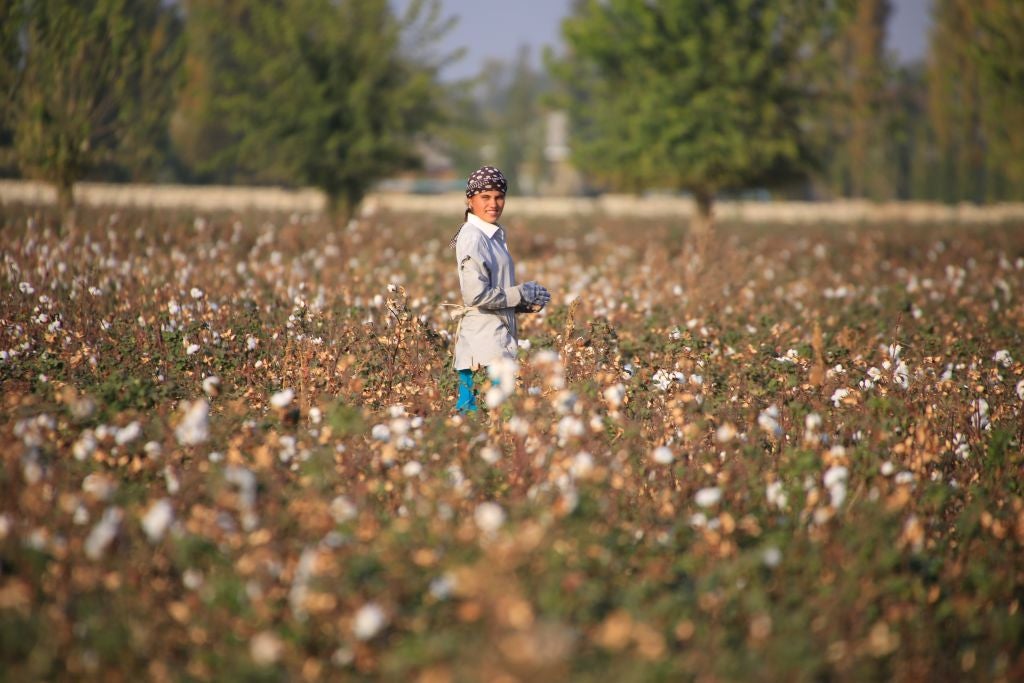
Uzbek Forum explains the complaint was filed with the Independent Project Accountability Mechanism (IPAM) of the European Bank for Reconstruction and Development (EBRD) following so-called “multiple reports” highlighting violations across Indorama Agro’s cotton operations in Syrdarya and Kashkadarya regions of Uzbekistan.
The NGO claims the “concerns were communicated to bank staff and company management over two-and-a-half years ago” but resulted in “no tangible improvements.”

Discover B2B Marketing That Performs
Combine business intelligence and editorial excellence to reach engaged professionals across 36 leading media platforms.
It adds that EBRD and the International Finance Corporation (IFC) financed loans totalling $130m to Indorama Agro for “modernising cotton production” and awarded a further loan of $25m to the cotton producer this year.
Uzbek Forum also claims to have interviewed “dozens of workers and farmers” who have reported the loss of livelihoods caused by what it describes as illegal land confiscations, lack of access to land, mass redundancies and so-called abuse of labour contracts, as well as attempts to dismantle the trade union.
The NGO continues that farmers contracted to deliver cotton to Indorama Agro have complained about delayed payments for the cotton they have delivered and exploitative contracts that include no minimum price for their cotton.
EBRD told Just Style it was unable to respond to request for comment, stating: “It is not permissible until the Independent Project Accountability Mechanism process is over.”

US Tariffs are shifting - will you react or anticipate?
Don’t let policy changes catch you off guard. Stay proactive with real-time data and expert analysis.
By GlobalDataWhile, IFC shared: “As with all IFC’s clients, Indorama Agro has committed to following IFC’s Environmental and Social Performance Standards, which define responsibilities for managing environmental and social risks, including the fair treatment of workers. IFC continues to work with Indorama Agro to help it constructively engage with all stakeholders as it responds to relevant complaints.”
On this matter, Indorama Agro’s COO Indranil Majumdar shared with Just Style that the allegations made in the subject report are “factually incorrect.” Stating for instance, it was the Government who leased the land to the company through a transparent and well-documented process within the legislative framework of the country.
Majumdar continues: “Similarly, IAL has a publicly stated policy of supporting and welcoming independent trade unions, which is duly elected in a free and fair election process. The management works closely with them on all employee-related matters and provides all necessary facilitation to them to carry out their work independently. Incidentally, the Trade Union that the article mentions is affiliated to FTUU (Federal Trade Union of Uzbekistan), we believe.
“The company initiated the new contracting services earlier this year to improve the incomes of families and to reach out to a larger section of the population within our farming districts. We have received an overwhelming response to this initiative and all our newly appointed service contractors are fully engaged in their work. The company strictly follows all legislative provisions with respect to labour practices in the country.”
In fact, he adds that Indorama works closely with International Lenders and Institutions, and diligently follows processes mandated by them in accordance with their required Performance Standards.
However, the director of Uzbek Forum for Human Rights Umida Niyazova claims the Indorama Agro project has caused immense harm to local communities since its inception.
She says: “Farmers’ land was unilaterally transferred to the company without prior, informed consent or compensation. Instead, farmers were given unfulfilled promises of full-time employment and are now struggling to feed their families.”
Bankwatch policy officer Nina Lesikhina adds: “The EBRD approved the project despite numerous reports of human rights violations. The bank failed to effectively assess the project’s environmental and social impacts and ensure meaningful stakeholder engagement required by the Bank’s standards. The EBRD ignored contextual risks associated with Uzbekistan’s cotton sector, resulting in harm to local communities. We expect IPAM to hold the bank to account and ensure that adequate remedy is provided.”
In addition to this, Uzbek Forum claims that after its interviews, farmers and workers were interrogated by what it describes as “security service officials” and warned against speaking to “international organisations.”
In a recent call for compliance with due diligence norms, the Clean Clothes Campaign (CCC) is urging more fashion brands and retailers to sign the Pakistan Accord for health and safety.





